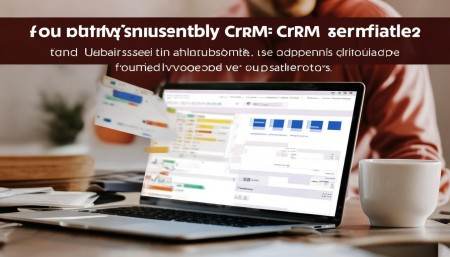
△Click on the top right corner to try Wukong CRM for free
Hey there! So, you've probably heard the term "CRM" thrown around a lot, right? It stands for Customer Relationship Management, and it's kind of a big deal in the business world. But what exactly is a CRM template, and why should you care? Let me break it down for you.
First off, imagine you're running a small business, and you've got a bunch of customers to keep track of. You need to remember their names, what they bought, when they last contacted you, and all sorts of other details. That's where a CRM comes in. It's like a super-organized digital Rolodex that helps you manage all your customer information in one place.
Now, a CRM template is basically a pre-designed format or structure that you can use to set up your CRM system. Think of it as a blueprint. You know how when you buy a new phone, it often comes with a few pre-installed apps to get you started? A CRM template is kind of like that. It gives you a head start by providing a framework that you can customize to fit your specific needs.
So, what does a CRM template actually do? Well, it helps you organize your customer data in a way that makes sense for your business. For example, if you run a retail store, you might want to track things like purchase history, customer preferences, and contact information. A CRM template will have fields and sections already set up for these kinds of details, so you don't have to start from scratch.
But it's not just about storing data. A good CRM template also helps you analyze that data. Imagine you're looking at a dashboard that shows you which products are selling the most, which customers are the most loyal, and which marketing campaigns are the most effective. All of this information is right at your fingertips, thanks to the template.
Another cool thing about CRM templates is that they can be really flexible. Let's say you start out with a basic template, but as your business grows, you realize you need to track more detailed information. No problem! Most CRM systems allow you to add or remove fields, so you can tailor the template to your evolving needs. It's like having a customizable tool that grows with your business.
And here's something else to consider: CRM templates can help you streamline your workflows. For instance, if you have a sales team, you might want to set up a template that includes a pipeline view, showing where each potential sale is in the process. This way, everyone on the team can see the status of each deal, and you can make sure nothing falls through the cracks.
But wait, there's more! CRM templates can also help you with customer service. Imagine you have a support team that needs to handle customer inquiries. A CRM template can include a ticketing system, where each customer issue is logged and tracked until it's resolved. This means no more lost emails or forgotten calls—everything is organized and easy to follow up on.
Now, I know what you might be thinking: "This all sounds great, but isn't setting up a CRM system complicated?" And honestly, it can be, especially if you're starting from scratch. But that's where the template comes in. It takes a lot of the guesswork out of the setup process. You can choose a template that's designed for your industry, and then tweak it to fit your specific needs. It's like getting a head start on a race—you're not starting from zero, you're already a few steps ahead.
And let's talk about the benefits for a minute. Using a CRM template can save you a ton of time. Instead of spending hours (or even days) setting up a system from scratch, you can get up and running much faster. This means you can start using the CRM to improve your business right away, rather than waiting for everything to be perfect.
Plus, a well-designed CRM template can help you stay organized. When you have a clear structure for your data, it's easier to find what you need, when you need it. No more digging through spreadsheets or trying to remember where you saved that important email. Everything is in one place, and it's all organized in a way that makes sense for your business.
And speaking of organization, a CRM template can also help you with reporting. Imagine you need to generate a report for a meeting, or you want to see how your sales are doing this quarter. With a CRM template, you can pull up the data you need in just a few clicks. No more manual data entry or complicated formulas—just clean, easy-to-read reports that give you the insights you need.
But it's not just about the data. A CRM template can also help you build better relationships with your customers. When you have all their information in one place, you can provide a more personalized experience. For example, if you know a customer's birthday, you can send them a special offer or a nice message. Or if you know they recently bought a certain product, you can follow up with a related offer. These little touches can go a long way in making your customers feel valued and appreciated.
And let's not forget about collaboration. If you have a team, a CRM template can help everyone stay on the same page. Whether it's the sales team, the support team, or the marketing team, everyone can access the same information and work together more effectively. This means fewer miscommunications and more seamless teamwork.
Now, I know some people might be a bit skeptical. Maybe you're thinking, "I've been managing my customers just fine without a CRM, why do I need one now?" And that's a fair question. But think about it this way: as your business grows, so does the amount of data you need to manage. What works for a small business with a handful of customers might not work for a larger business with hundreds or even thousands of customers. A CRM template can help you scale your operations and stay organized, no matter how big your business gets.
And if you're worried about the cost, many CRM systems offer free or low-cost templates to get you started. You don't have to invest a ton of money upfront to see the benefits. Plus, the return on investment can be pretty significant. By improving your customer relationships, streamlining your workflows, and making better data-driven decisions, you can see real improvements in your bottom line.
So, to sum it up, a CRM template is a pre-designed structure that helps you set up and organize your CRM system. It saves you time, keeps you organized, and helps you build better relationships with your customers. Whether you're just starting out or you're looking to take your business to the next level, a CRM template can be a game-changer.

Alright, I hope that helps! Do you have any questions about CRM templates or how they can benefit your business? Here are a few common ones:
Q: Can I customize a CRM template to fit my specific needs? A: Absolutely! Most CRM systems allow you to add, remove, or modify fields to tailor the template to your business. It's all about making it work for you.
Q: Are CRM templates only for large businesses? A: Not at all! CRM templates can be incredibly useful for small businesses too. They help you stay organized and grow your customer base, no matter the size of your business.

Q: How do I choose the right CRM template for my business? A: Start by thinking about your specific needs. What kind of data do you need to track? What are your main goals? Then, look for a template that aligns with those needs. Many CRM providers offer templates for different industries, so you can find one that fits.
Q: Is it difficult to set up a CRM template? A: Not really! Most CRM systems are designed to be user-friendly, and the templates come with step-by-step instructions. If you get stuck, there are usually plenty of resources and support available.

Q: Can a CRM template help with marketing and sales? A: Definitely! CRM templates can help you track leads, manage your sales pipeline, and even automate some of your marketing efforts. It's a great way to boost your sales and marketing effectiveness.
Q: Are there free CRM templates available? A: Yes, many CRM providers offer free templates to get you started. Some even have free versions of their software, so you can try it out before committing to a paid plan.
I hope these answers help! If you have any more questions, feel free to ask. Happy CRM-ing!
Related links:
Free trial of CRM
Understand CRM system
AI CRM Systems

△Click on the top right corner to try Wukong CRM for free